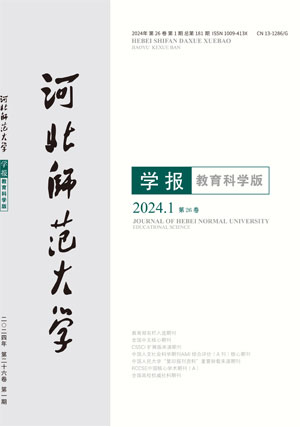期刊信息

- 刊名: 河北师范大学学报(教育科学版)Journal of Hebei Normal University (Educational Science Edition)
- 主办: 河北师范大学
- ISSN: 1009-413X
- CN: 13-1286/G
- 教育部名栏入选期刊
- 全国中文核心期刊
- CSSCI扩展版来源期刊
- AMI综合评价(A刊)核心期刊
- RCCSE中国核心学术期刊
- 全国高校特色栏目社科学报
- 中国人民大学“复印报刊资料”重要转载来源期刊
- 全国高校权威社科期刊
人工智能时代教育变革的理性思索
-
作者单位:1. 天津师范大学 教育学部, 天津 300387;
2. 北京师范大学 教育学部, 北京 100875 -
起止页码:112 - 118页 -
DOI:10.13763/j.cnki.jhebnu.ese.2020.06.014
Rational Thinking on Educational Reform in the Age of Artificial Intelligence
摘要/Abstract
人工智能所具有的数据共享、跨界融合、指数思维、人机融合等特征正在从不同维度以多种方式改变着人们对世界的认知与把握,人工智能正全方位、多角度地推动着科技的发展与社会的进步。它对教育实践同样产生着重大而全面的冲击,学校教育从培养目标、教育内容、教与学方式、教师能力和校园系统等诸多方面对此进行积极调适与变革。与此同时,在人工智能与教育互相碰撞、影响与融合的背景之下,必须厘清与坚守教育的本质与规律,坚守对人本身的尊重,注重人与人的互动,承担起教育“成人”使命,从而使得人工智能时代的教育变革更具生命力,为社会的发展与个人的成长发挥更加积极的作用。
Artificial intelligence, with such characteristics as data sharing, cross-disciplinary integration, exponential thinking and human-computer integration, is changing and furthering human cognition and control of the world from different dimensions and in various ways. It promotes the development of science and technology and the progress of society in all aspects. It also makes great comprehensive impact on educational practice. Active adjustments and changes are made in school education from many aspects, such as training objectives, educational content, teaching and learning methods, teachers' competence and campus system. At the same time, under the collision, influence and integration between artificial intelligence and education, we must clarify and adhere to the nature and law of education, respect human beings in themselves, pay attention to the interaction between people, and foster character and virtue through education. Thus, education reform in the age of artificial intelligence has more vitality, and plays a more positive role in the development of society and personal growth.
关键词
参考文献 31
- [ 1 ] 新华社.习近平向国际人工智能与教育大会致贺信[EB/OL].(2019-12-15)[2019-08-07].http://www.gov.cn/xinwen/2019-05/16/content_5392134.htm.
- [ 2 ] 唐汉卫.人工智能时代教育将如何存在[J].教育研究,2018(11).
- [ 3 ] 贾积有.人工智能赋能教育与学习[J].远程教育杂志,2018(1).
- [ 4 ] 朱永新,徐子望,鲁白,等."人工智能与未来教育"笔谈(上)[J].华东师范大学学报(教育科学版),2017(4).
- [ 5 ] 武晶晶.关于人工智能教育应用的几个问题[J].教育教学论坛,2012(9).
- [ 6 ] 蔡自兴.人工智能及其应用[M]. 北京:清华大学出版社,2016.
- [ 7 ] 国务院.国务院关于印发新一代人工智能发展规划的通知国发[2017] 35号[EB/OL].(2019-12-15)[2019-08-07].http://www.gov.cn/zhengce/content/2017-07/20/content_5211996.htm.
- [ 8 ] [美]Ray Kurzweil.奇点临近[M].李庆诚,董振华,田源,译.北京:机械工业出版社,2011.
- [ 9 ] 黄欣荣.人工智能与人类未来[J].新疆师范大学学报(哲学社会科学版),2018(4).
- [ 10 ] 谭铁牛.人工智能的历史、现状和未来[J].智慧中国, 2019(Z1).
- [ 11 ] 祝智庭,俞建慧,韩中美,等.以指数思维引领智慧教育创新发展[J].电化教育研究,2019(1).
- [ 12 ] 闫志明,唐夏夏,秦旋.教育人工智能(EAI)的内涵、关键技术与应用趋势——美国《为人工智能的未来做好准备》和《国家人工智能研发战略规划》报告解析[J].远程教育杂志,2017(1).
- [ 13 ] [英]Tony Thorne MBE.奇点来临[M].北京:人民邮电出版社,2016.
- [ 14 ] 霍金:人工智能未来将发展出自己的意志,与人类意志冲突[EB/OL].(2019-12-15)[2016-10-26]. https://tech.qq.com/a/20161026/028155.htm.
- [ 15 ] 李政涛.当教师遇上人工智能……[J].人民教育,2017(Z3).
- [ 16 ] 李政涛.人工智能时代的人文主义教育宣言——解读《反思教育:向"全球共同利益"的理念转变》[J].现代远程教育研究,2017(5).
- [ 17 ] 吴永和,刘博文,马晓玲.构筑"人工智能+教育"的生态系统[J].远程教育杂志, 2017(5).
- [ 18 ] 牛舜君.人工智能在教育中的应用研究综述[J].信息技术与信息化, 2019(7).
- [ 19 ] 卡尔·雅斯贝尔斯.什么是教育[M].北京:生活·读书·新知三联书店,1991.
- [ 20 ] 叶澜.回归突破:"生命·实践"教育学论纲[M].上海:华东师范大学出版社,2015.
- [ 21 ] 联合国教科文组织.北京共识——人工智能与教育[EB/OL].(2019-12-15)[2019-06-30].https://www.sohu.com/a/323952287_100020578.
- [ 22 ] 张坤颖,张家年.人工智能教育应用与研究中的新区、误区、盲区与禁区[J].远程教育杂志, 2017(5).
- [ 23 ] 吴传刚.人工智能时代的教育转向及发展理念[J].未来与发展,2018(11).
- [ 24 ] 马克思,恩格斯.马克思恩格斯全集(第23卷)[M].北京:人民出版社,2016.
- [ 25 ] Minsky M L,Singh P,Sloman A.The St.Thomas common sense symposium:designing architectures for human-level intelligence[J].AI Magazine, 2004(2).
- [ 26 ] Ewa M Golonka,Anita R Bowles,Victor M Frank,et al.Technolo-gies for Foreign Language Learning:A Review of Technology Typesand their Effectiveness[J].Computer Assisted Language Learning,2014(1).
- [ 27 ] McKinsey Global Institute. Jobs lost, jobs gained:what the future of work will mean for jobs, skills,and wages[EB/OL].(2019-12-15)[2019-04-26].https://www.mckinsey.com/featured-insights/future-of-work/jobs-lost-jobs-gained-what-the-future-of-work-will-mean-for-jobs-skills-and-wages.
- [ 28 ] 李宏堡,袁明远,王海英. "人工智能+教育"的驱动力与新指南——UNESCO《教育中的人工智能》报告的解析与思考[J].远程教育杂志,2019(4).
- [ 29 ] 叶澜.教育概论[M].北京:人民教育出版社,2006.
- [ 30 ] 陈丽,逯行,郑勤华."互联网+教育"的知识观:知识回归与知识进化[J].中国远程教育, 2019(7).
- [ 31 ] 牟智佳."人工智能+"时代的个性化学习理论重思与开解[J].远程教育杂志,2017(3).
